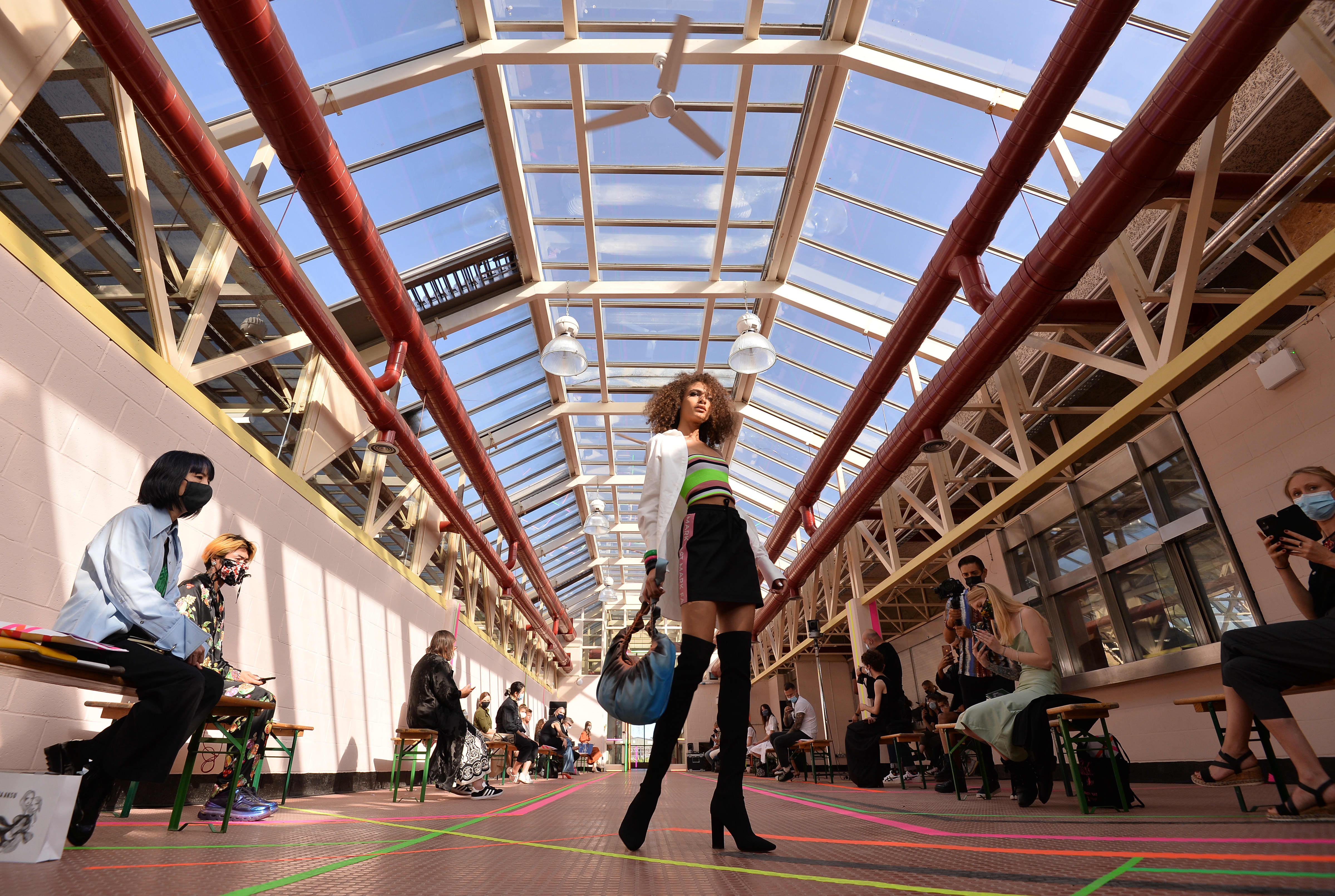Coronavirus hit to fashion industry is ‘incredibly concerning,’ British Fashion Council Chairman says

British Fashion Council Chairman Stephanie Phair has told CNBC that the threat of job losses across the U.K. fashion industry in the wake of the coronavirus pandemic is “incredibly concerning.”
The coronavirus crisis has hit fashion demand hard, with several retailers announcing large-scale job losses or going out of businesses altogether. Researchers at Oxford Economics have forecast that as many as 350,000 positions could be affected industry-wide.
The forecasting company also said it anticipates the industry’s contribution to U.K. GDP could fall to £26.2 billion ($33.9 billion) in 2020, down from £35 billion in 2019, while revenues could drop to £88 billion this year, from £118 billion in 2019.
Speaking during London Fashion Week September 2020, Phair said the fashion industry was responsible for around 900,000 jobs.
“So, whether it’s business rate relief, rent relief, funding and loans to help with cash flow issues, these are the sorts of things we’re talking to the government (about) because it is a significant portion of the U.K.’s employed population,” she said.
However, despite Covid-19’s “significant” impact on the industry, Phair believes there is now an opportunity to reset, and for “designer businesses to think about how do they rebuild on better foundations.”
London Fashion Week
Although described as a digital-first event this year, London Fashion Week will see the first physical presentations since the coronavirus outbreak, held under strict Covid-19 government guidelines.
When asked whether an expected drop in the number of international buyers could impact sales, Phair told CNBC that the British Fashion Council hoped technology would help “solve some of these gaps.”
“Typically, designers sell between 150 to 200 million in receipts at Fashion Week itself … so it will have an impact, but we’re working with technology. We’ve partnered with a company … which allows orders to be placed online and we can do that through our Fashion Week hub,” she said.
A model walks the runway during the Mark Fast show during LFW September 2020 at Hackney Depot on September 18, 2020 in London, England.
Jeff Spicer | BFC | Getty Images
Phair, who is also chief customer officer at Farfetch, the luxury e-commerce platform, said Covid-19 had “accelerated a lot of the conversations” that had been happening in the industry before, including the debate on the need for bricks and mortar stores and the decline in footfall on the high street.
“Both the designer sector and the high street will have to adapt to this new reality and be even more creative, which is something that I trust the British fashion industry to do. Creativity, innovation, resilience has always been one of the hallmarks of this industry, and now’s the time to really show that,” she said.
Sustainability, diversity issues
Phair said she believes there is a role for the high street and that “we need a fashion industry at all price points,” but that sustainability is the key to reconnect with customers.
“There’s a whole sustainability angle to this, and if the high street can understand that you can create product at a good price point but with sustainability in mind, that will be the solution to get the consumer back and really get them on side again,” she said.
Phair, who became chairman of the British Fashion Council in 2018, says that although a lot has already been done, the fashion industry must “face up to the fact” that it is a “large contributor to carbon emissions,” including on production, waste and transportation, which all still need to be addressed.
The British Fashion Council says it will also continue to address issues regarding diversity and inclusion across the industry, including the recent appointment of four new non-executive board members.
Although she believes the Council has made progress, Phair said there is “still a lot to do”.
She said it was “very sad” that it had taken a number of recent tragedies, including the death of George Floyd in the U.S., to make many businesses pay attention to the issues, but that they are now looking to the future and building upon that.
Brexit concerns
Prior to the impact of the coronavirus, the British Fashion Council had expressed its concerns over the effect a no-deal Brexit.
“Brexit remains a concern … it is the uncertainty for business that is difficult because you find it very hard to plan,” Phair said. “We’ve been working on behalf of the industry to really get answers and certainty and to weigh in so that as negotiations happen, the fashion industry can be taken into account.”
When asked how she felt Brexit could impact the industry’s key international markets, Phair replied: “I think that the British fashion industry has always been outward looking and will continue to be outward looking … and we just need to hope that that the tax regime, the trade tariffs aren’t negatively affecting an industry that is a huge calling card for the U.K. in terms of brand Britain.”
Despite all the challenges the industry is facing from the Covid-19 crisis and Brexit, Phair remains positive. “I am optimistic. I think if something defines the British fashion industry, it’s its resilience, how innovative it is… the British fashion Council has always pushed the envelope on digital and technology and we’re seeing the fruits of that now.”




